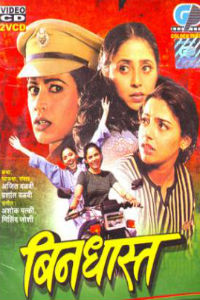Discussion on ‘Woman in socialistic reality and cinema’
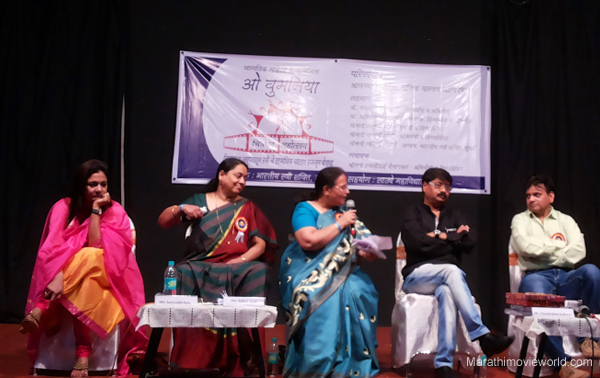
8th March is celebrated throughout the globe as International Women’s Day and to mark the occasion variety of programmes take place e.g. Bike rallies, Half Marathons, talk shows etc. Varsha Tawde, better half of Honourable State Minister Vinod Tawde, through her Bharatiya Stree Shakti organisation, organised a panel discussion on ‘Woman in socialistic reality and cinema’, through a film festival ‘O Womaniya’ which screened international, national and regional films, at Sathye college auditorium in Mumbai.
National award winning film/drama director, Chandrakant Kulkarni , Pallavi Joshi, a national award winning actress , Abhiram Bhadkamkar, director, actor and writer , Samruddhi Porey, national award winner film maker, were the panellist , whereas Rajni Velankar, a well known name in acting field, conducted the function. The discussion started on a controversial documentary ‘India’s Daughter’ on Nirbhaya, with a question on film’s impact on crimes and rapes in society.
Chandrakant Kulkarni denied any such impact and said at length ‘All my body of work has been women-centric in some way or the other. If films are responsible for atrocities in society, then why the image of police depicted in films is contrary to that?’ Though Samruddhi Porey admitted that fractionally it may be true, but posed a counter question, how come good things are not picked up from films?’
On aggressive views of Ragini Chandratre, President BSS, writer Abhiram Bhadkamkar countered saying ‘no one wants labelling on these issue’ and stated that females in films are still searching for an identity. “Because, films raised issues of women, women started realising about their own issues. Rapes existed even before films were made.” he continued . Pallavi Joshi, who joined the panel a little late ,realistically stated, “Earlier villain/vamps in films showed us a mirror as to what was wrong in our society. But in today’s scenario no one knows who the villain is; and we are witnessing circus in the name of cinema. A lot of film makers are interested in women-centric subjects but lack of viewers’ patronage discourages them. We as a audience should support these ventures as we support other commercial films” she was talking in depth. In fact both Joshi and Kulkarni, with their light hearted comments, kept the audience in good spirit.
Bindhast ( बिनधास्त )
Genres: Drama
Rating: na
Censor: U
Duration: 157 min.
Studio/presenter: jigisha creations
Producers: Shivaji Chate, Gopichand Chate
Executive Producer: na
Director: Chandrakant Kulkarni
Writer: Ajit Dalvi, Prashant Dalvi
ScreenPlay: Ajit Dalvi, Prashant Dalvi
Dialogues: Ajit Dalvi, Prashant Dalvi
Official Facebook Page I Twitter
Cast & Crew
Executive Producer: na
Director: Chandrakant Kulkarni
Assistant Director: Santosh Todankar
Writer: Ajit Dalvi, Prashant Dalvi
ScreenPlay: Ajit Dalvi, Prashant Dalvi
Dialogues: Ajit Dalvi, Prashant Dalvi
Lyrics: Saumitra, Dasu Vaidya
Music: Ashok Patki, Milind Joshi
Playback Singer: Kavita Krishnamurthy, Hema Sardesai, Bela Sulakhe, Ravindra Sathe
Cinematographer (DOP): Sameer Athalye
Editor: Jafar – Dilip
Starcast: Reema Lagoo, Gautami Madhur, Sharvari Jamenis, Mona Ambegaonkar, Minal Pendse, Deepa Sriram, Nirmiti Sawant, Jyoti Chandekar, Reshma Polekar, Rujuta Deshmukh, Seema Biswas, Pratiksha Lonkar
Costumes: Asita Narvekar
Makeup: Pandhari Jukar
Sound : Vijay Bhope
Background Score: Atul Raninga, Milind Joshi
Choreographer: Chinni Prakash
DI, VFX: na
D.I. Colourist: na
Promos: na
Music Label: na
Publicity Designs: na
P.R.O.: na
Distributor : na
Synopsis
‘Bindhast’ : na
Videos
News / Article / Interview
na
Movie Still(s)
na
Poster(s)
Review
Wada Chirebandi (वाडा चिरेबंदी) Marathi Natak
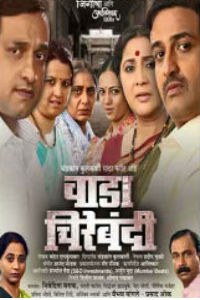
Rating: na
Opening Date: na
Production House: Jigisha and Ashtavinayak Nirmit
Producers: Dilip Jadhav, Shripad Padmakar
Presenter: Chandrakant Kulkarni
Writer: Mahesh Elkunchvar
Director: Chandrakant Kulkarni
Official Facebook Page I Twitter
Credit List
Co-producer(s): Sanjyot Vaidya, Arjun Mudda
Director: Chandrakant Kulkarni
Writer: Mahesh Elkunchvar
Dialogues: na
Artist: Nivedita Saraf, Bharati Patil, Siddheshwar Zadbuke, Neha Joshi, Pournima Manohar, Pratima Joshi, Vinita Shinde, Ajinkya Nanavare, Vaibhav Mangle, Prasad Oak
Set Design: Pradip Mulye
Lights: Ravi-Rasik
Costume: na
Background Music: na
Makeup: na
Costume Designer: na
Hair Style: na
Art: na
Lyrics: na
Music: Anand Modak
Playback singers: na
Choreographer : na
Publicity Designs: na
Synopsis
‘Wada Chirebandi': ‘WADA’ is Chetan Datar’s edited version of the famous ‘WADA’ trilogy plays by Mahesh Elkunchwar. Awishkar’s production instead of beginning with ‘WADA CHIREBANDI’ (the first play of the trilogy) begins with the final scene from ‘YUGANT’ which is last in the trilogy. Datar’s attempt at turning a seven-odd hour play into a two-hour one remains to be seen. It nevertheless is an opportunity to live the texts, especially ‘WADA CHIREBANDI’ which has come to be considered as one of the classics of Marathi Literature.
News / Article / Interviews
Poster(s)

Review
‘Aajcha Diwas Majha’ depicts clash of Ego with Conscience
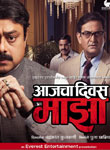 |
Rating: ★★★
Studio: Everest Entertainment, White Swan Producer: Puja Chhabria Director: Chandrakant Kulkarni Music: Ashok Patki, Mangesh Dhakde Cinematography: Rajan Kothari Cast: Sachin Khedekar, Ashwini Bhave, Mahesh Manjrekar, Pushkar Shrotri, Anand Ingle, Hrishikesh Joshi, Sunil Tawade, Bharat Ganeshpure Movie Review by: Ulhas Shirke |
Never humiliate anyone with your pride or ego. Time comes, when you learn through your own mistake, however powerful person you are. This is what director Chandrakant Kulkarni’s new film ‘Aajcha Diwas Majha’ tries to suggest, through a happening in the life of a Chief Minister of Maharashtra, who has just returned from Delhi, managing his position, in spite of facing opposition from his own ministry.
It so happens that one evening CM(Sachin Khedekar) along with his wife(Ashwini Bhave) attend the wedding in the family of chief justice, where the Governor of the state, an arch rival of CM is also present. CM deliberately arrives late, almost at the time, when Governor is about to leave. He confronts with him in presence of his wife. Later when the chief justice introduces him to dignitaries present at the function; he notices one of them not standing up to greet him. When the chief justice is about to introduce this special guest who is a classical singer; the chief minister humiliates him and suggests to the chief justice about his rude behaviour. But, when the chief justice tells him that the singer is blind; he repents his mistake.
The minister becomes restless and feels ashamed of himself for his behaviour in public. He leaves the function hurriedly and on reaching home, sends his Personal Secretary P.D. Shinde ( Rishikesh Joshi) back to the function to find out, what way he could help the singer. When he comes to know that the singer has sent an application in the form of reminder to allot a flat from CM’s special quota for artistes, he orders to reopen his previous application made eight years ago, during other CM’s regime.
The entire department of Housing is summoned to Mantralaya that late evening, so as to issue the keys of the flat to the singer next day morning. The Housing Secretary Mr. Rahmatpurkar ( Mahesh Manjrekar) , who is an IAS officer, is initially reluctant to attend to such a request; but, he cannot say anything when CM speaks to him personally. Then we see all the concerned people at the deputy secretary level, assistants and the steno/ typists at work during that night.
The film throws light on the personal life and problems of an IAS officer, working as Secretary at Mantralaya, the Personal Secretaries to Ministers and the other important staff; who are 24 hours at the service of CM. In the climax scene, we find the shrewd CM, taking his own decision, realising the game played by the IAS officer, while allotting the flat from his quota to the singer.
The film has limited theme; but director Chandrakant Kulkarni has very cleverly generated interest in the screenplay, whether it is thought provoking confrontation between CM and the Governor, or between CM and the chief Secretary and also the rivalry between CM and the Industry Minister from his own cabinet. There is one dialogue which is uttered by CM to the Governor, who is also seeking power, “That Governor is the best, who governs the least.”This is all we have been experiencing in every state of India. But, the treatment given to the political based script of this film is different.
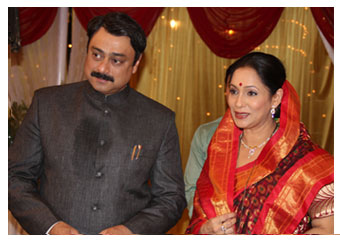
In the role of CM, Sachin Khedekar has proved that he is a versatile actor. Ashwini Bhave has played his wife’s role confidently, paying more attention on her perfect rural accent. Mahesh Manjrekar, playing the IAS cadre Secretary, looks a perfect match for this role. He finds an opportunity to display his frustration, when he encounters his own daughter( Poorva Pawar) rejecting the proposal of IAS fresher and expresses her desire to marry someone with strong political background. In the roles of other officers from Mantralaya, talented Pushkar Shrotri and Anand Ingale have played their parts very well. But, it is Rishikesh Joshi, in the role of CM’s Personal Secretary, steals the show. He has expressed his emotions very well, especially when he regrets his inability to return home that night, to greet his son, who has passed the Board exams with 92%.
Others in the supporting cast look very realistic. Music has limited scope in this film; but the classical song picturised on the blind Singer is good. Dialogues are well written with perfect sound and editing work. In short, ‘Aajcha Diwas Majha’ is the clash of Ego with conscience, when the person holding the highest post in Maharashtra Politics, realises his mistake and tries to recompense, going out of his way.The film is a tribute to Cinematographer late Rajan kothari, who has left his memories with his excellent photography in this film.
Aajcha Diwas Majha ( आजचा दिवस माझा )
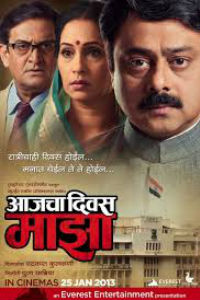
Genres: Drama
Rating: ★★★
Censor: U
Duration: 130 min.
Studio/presenter: Everest Entertainment, White Swan
Producer(s): Puja Chhabria
Executive Producer: Jeetendra Kulkarni, Kaushal Goyal
Director: Chandrakant Kulkarni
Writer: Ajit Dalvi, Prashant Dalvi
ScreenPlay: Ajit Dalvi, Prashant Dalvi
Dialogues: Ajit Dalvi, Prashant Dalvi
Official Facebook Page I Twitter
Cast & Crew
Executive Producer: Jeetendra Kulkarni, Kaushal Goyal
Director: Chandrakant Kulkarni
Assistant Director: na
Writer: Ajit Dalvi, Prashant Dalvi
ScreenPlay: Ajit Dalvi, Prashant Dalvi
Dialogues: Ajit Dalvi, Prashant Dalvi
Lyrics: Dasoo
Music: Ashok Patki, Mangesh Dhakde
Playback Singer: na
Cinematographer (DOP): Rajan Kothari
Editor: Rahul Bhatankar
Starcast: Sachin Khedekar, Ashwini Bhave, Mahesh Manjrekar, Pushkar Shrotri, Anand Ingle, Hrishikesh Joshi, Sunil Tawade, Bharat Ganeshpure
Costumes: na
Makeup: na
Sound : na
Background Score: na
Choreographer: na
DI, VFX: na
D.I. Colourist: na
Promos: na
Music Label: na
Publicity Designs: na
P.R.O.: na
Distributor : na
Synopsis
‘Aajcha Diwas Majha’ : Director Chandrakant Kulkarni’s film ‘Aajcha Diwas Majha’ tries to suggest, through a happening in the life of a Chief Minister of Maharashtra, who has just returned from Delhi, managing his position, in spite of facing opposition from his own ministry.
Videos
News / Article / Interview
na
Movie Still(s)
na
Poster(s)

Review
‘Pipani’ presents a Black comedy to deliver a timely message
 |
Rating: na
Banner: Tanishq Digital Eye Producer: Baburao Bhor Director: Gajendra Ahire Story, Screenplay, Dialogues, Lyrics: Gajendra Ahire Music: Chaitanya Adkar Cast: Makrand Anaspure, Chandrakant Kulkarni, Ravi Kale, Ramesh Dev, Kranti Redkar, Vaibhav Mangale, Satish Taare, Bharat Ganeshpure, Hemangi Kavi Dhumal, Vikas Samudre Movie Review by: Ulhas Shirke |
We are all aware that India is agriculture based country with around 60% of its population directly or indirectly dependent on agriculture, as their income. But, in India, Agriculture is often attributed as gambling with seasonal monsoon. The failure of seasonal monsoon, leads to a series of droughts. But, sometimes, un-seasonal monsoon showers, also creates havoc on crop with heavy loss, resulting in lack of better prices to farmers. But, mainly, it is the exploitation by the Middlemen, the main cause of a series of suicides committed by farmers across India.
It is said that on an average, one farmer commits suicide every 30 minutes in India. And, the state of Maharashtra is among the leading states reporting such tragedies. Latest released film ‘Pipani’ is all about this tragic situation in our country, which has been shot on the backdrop of a village in Vidarbha region in Maharashtra. Now, to highlight the situation, film maker Gajendra Ahire has used a plot, where a Hollywood film maker Freda Russel (Kristin Piesker) is shown making a feature film, to invite the attention of the world to this tragic state of farmers in this region and the reality behind it.
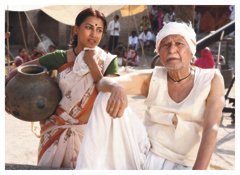
The film opens with a narrator Dnyaneshwar Tembhre (Chandrakant Kulkarni) a Circle officer of the Block, posted by the State Government. When he receives a request from his department to offer all the help to the visiting foreigner, he obliges by deputing Popat Jhadbuke (Makarand Anaspure) his most trusted man, to help the lady. Popat arranges her meetings with different people, beginning with Nanda (Hemangi Kavi), a widow, whose farmer husband has recently committed suicide.
Highly impressed with the location, when Freda returns with her unit team to shoot a film, her female character Kranti (an actress) seeks help from Nanda to be more realistic through her body language. The film also shows actor Ravi kale playing her husband and veteran actor Ramesh Deo playing her father in law. A Film which has been shot in this film, focuses more on the emotional part of the artistes and tries to show how the middlemen cheat the farmers from getting their dues. The scenes cover damage to crop due to un-seasonal rains and the helplessness of the farmers, forcing them to commit suicide.
But, what is more important is director Gajendra Ahire throwing light on other aspects; such as the effect of the happenings during the shooting, on the real life of the local villagers and how the middlemen in the film production department exploit the villagers. The director has tried to create humour through the character of Popat, who makes hard hitting statements in his typical style, blaming the administration for their apathy to uplift the lives of farmers with schemes and packages to boost their morale. There is one character who is shown as a helper to Popal (Vikas Samudre), who keeps on reminding him about the schemes.
Some form of humour is also created in one of the scenes, where Ravi kale, in an attempt to show his superiority to the actress kranti, tells her that he is a big actor, having worked with Mr. Amitabh Bachchan, when the veteran actor Ramesh Deo playing his old father is shown reacting, “So what ? I have performed with Rajesh Khanna and Amitabh Bachchan together.” There are many such humour filled sequences, which openly point out the neglect by the Government department, in finding the solution towards development of the Block. The transfer of the SDO to Pune, clearly goes on to say everything, after the shoot of the film is over.
The film conveys a strong message to the entire world about the ground level situation in this so called progressive nation. When Danny Boyle could make a film like ‘Slumdog Millionnaire’ projecting the slums of Mumbai in a cheap mediocre style, ‘Pipani’ has rightly concluded indicating that the film made by Freda Russel reflecting the real situation of the village can also win Oscars award. When Popat tells this news to an old villager, he replies, “What have we got?”. And, that delivers the film’s message. The film has openly used the advertisements of the sponsors, when Popat calls it an official break, before the commercial scene was played.
As a Hollywood director Kristin Piesker from Germany has done a good job. She is very much at ease, in her debut film. Makarand Anaspure is best suited in the role of Popat. Kranti Redkar finds the best opportunity to display her talent as an actress in search of a role, to win national award. Ravi kale, Chandrakant Kulkarni and Ramesh Deo look very natural in their respective roles. Vaibhav Mangle, Bharat Ganeshpure and Vikas Samudre have little to their share; but their presence counts. But, it is Hemangi Kavi, who invites all the attention. She presents a perfect village woman with her body language and excellent spontaneous expressions. Chaitanya Adkar’s music is well suited to this subject and backdrop and Chandrashekar Aiyer’s cinematography captures some of the realistic emotion filled scenes. Editing by Santosh Gothoskar is perfect. ‘Pipani’ produced by Baburao Bhor, is a sincere attempt to present reality through a cinematic format. You may call it a Black comedy.
Realistic ‘Tukaram’ is a work of art
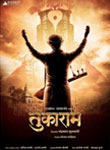 |
Rating: na
Banner: Everest Entertainment Producer: Sanjay Chabria Director: Chandrakant Kulkarni Story: Ajit Dalvi, Prashant Dalvi Cinematographer: Rajan Kothari Editor: Ballu Saluja Cast: Jeetendra Joshi, Veena Jamkar, Ravindra Mankarni, Madhav Abhyankar, Radhika Apate, Sharad Ponkshe, Pratiksha Lonkar, Yatin Karyekar Movie Review by: Ulhas Shirke |
The reality behind the popularity of the literature of Sant Tukaram, the 17th Century saint and poet from Maharashtra was his thought provoking literature. It has been translated into 10 European languages, which itself speaks about his selfless service. In the year 1936, a Biopic made by Prabhat Film Company on this well known Saint, had invited attention from all over the world and the film was the first Indian film to receive award at 5th Venice International Film Festival. The film still remains popular and is subject of frequent studies.
Today, when people have turned to materialistic living, producer Sanjay Chaberia has dared to produce a Biopic on the famous saint, under the direction of Chandrakant Kulkarni and on the script of Ajit Dalvi and Prashant Dalvi. This film focuses on his life before sainthood, trying to cover his childhood with his family and later assisting his father in his traditional money lending business. Very cleverly, the director has tried to show the maturity of young Tukaram in understanding the poverty in his village, during drought and still managing to maintain a balance between his business minded father and the defaulters,using his diplomacy.
The film also goes on to show, how during that period of 17th century, the elders forced their children for second marriage, if the first wife failed to conceive. So, we find a firebrand young woman- Avali walking into the life of Tukaram in presence of his first wife Rakhma, who willingly agrees for the same, to make her mother-in law happy. Initially, Tukaram is not fully devoted to Lord Vitthal; as much as his brother Savji . In fact, as a child, he poses question to his father, as to why he has to travel on a pilgrimage in the form of ‘Vaari’ every year, to seek blessings of Lord Vitthal, when there is already a temple of the same Lord in their village.
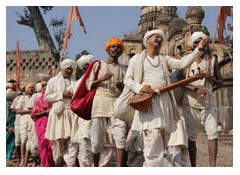
A little before interval, the film shows the transformation of Tukaram into Saint Tukaram, when he leaves his house in search of peace and happiness for all those who suffer the drought conditions. The Saint’s poems and his Kirtans( devotional songs) gather support from devotees from different places, including Bramhmins. This disturbs some of the selfish Bramhins, who demand respect to their profession and feel that no other person from a lower caste has the right to offer kirtans. So, Tukaram is tried in the court of so called religious leaders; and asked to destroy his collections and prevented from writing any more lyrics. The caste discrimination occurring those days, is clearly shown through some of the scenes. But, the popularity of the Saint gathers support from the places around and the Saint is forced to break his 13 day fast.
Director Chandrakant Kulkarni has covered most of the important events in the life of the Saint Poet, starting with his childhood days, his young days, while assisting in his father’s business, post marriage tragic events faced by the family and later his turning towards devotion to God and selfless service to the society. The incidences of his advice to Bahinabai a Varkari female, who later turned a saint from Maharashtra, his encouragement to brave young man from village- Laxman, to join the force of Shivaji Maharaj and also his interaction with the Great Maratha Warrior, have been well captured. The wonderful photography by Rajan Kothari makes the film more appealing, with the proper selection of ideal locations and costumes.
Jitendra Joshi who portrays the popular saint, simply steals the show with his remarkable performance. His body language, dialogue delivery and changing expressions according to the situations, test his tremendous capacity as an actor. Sharad Ponkshe as Bolhoba Ambile More (Tukaram’s father) and Pratiksha Lonkar as Kanakai (Tukaram’s mother), impress with their astonishing performances. Veena Jamkar playing his first wife Rakhma and Smita Tambe playing his sister-in-law, have displayed their talents through those few emotion filled scenes, they have to their credits. Yatin Karyekar as Mambaji Gosavi, the orthodox Bramhin, succeeds in creating an impact through his negative role. Radhika Apte in the role of Aaavli, the saint’s second wife sounds very loud; but that must be going with the requirement of the script. She too has done a good job in the company of artistes like Vikas Patil, Madhav Abhyankar, Ravindra Mankani and others. Padmanabh Gaikwad as young Tukaram has also done a good job. This biopic, is a real tribute to the great saint of Maharashtra.
‘Tukaram’ is a timely release, when we find our own country’s administration surrounded by corrupt practices and the people of today getting used to such practices. Presenting the thoughts of the Saint into a cinematic format and reminding the message behind his meaningful lyrics, with suitable music compositions, this realistic film has turned out to be a real work of art.
‘KADACHIT’ REVIEW
 |
Rating: na
Producer: Mrs. Usha Bhave Director: Chandrakant Kulkarni Story: Girish Joshi Cast: Ashvini Bhave, Sachin Khedekar, Sadashiv Amarapurkar, Tushar Dalavi, Sulekha Talvalkar, Dr.Sharad Bhutadiya, Satish Aalekar… Movie Review by: Nayana |
Truth is always stranger than the fiction. Nevertheless, every one runs behind the truth. But sometimes we realize that it is better if some things remain unknown. The new marathi movie ‘Kadachit’ deals with conflict between truth and lies and its alarming impact on emotional entanglement resulted in psychological disorders.
Marathi Mulgi and the Producer of ‘Kadachit’, Ashwini Bhave was very excited talking to MMW team about this film. A well-known Neuro-surgeon Dr. Gayatri Pradhan, her husband and her lovely daughter Piyu… live happily till one day when a person (better to see this person on screen) from Gayatri’s past enters their lives and the happiness shatters. A little mistake done by Gayatri unintentially in the past disturbs the whole life of that person and when she realises this she gets psychologically disturbed . At last the truth comes into the light and Gayatri not only recuperates from this mental disorder but rejuvenate her beautiful life.
Well-known producer Girish Joshi has written the story. Ashwini accepted the challenge to make a movie on it and succeeded with the help of Director Chandrakant Kulkarni(‘Bindhast’ fame). Dialogues are by Girish Joshi.
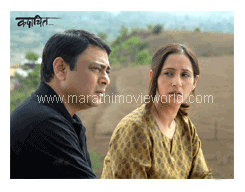
After a prolong stay abroad, the graceful Ashwini has arrived with a bang!! A confident and successful Neuro- surgeon, an ideal wife, a caring mother and a collapsed lady… Ashwini has played the lead role whole- heartedly. Accompanying actors Sachin Khedekar, Tushar Dalvi, Sharad Bhutadia, Sulekha Talwalkar and child artist Twinkle Raikar’s performances are outstanding. Sadashiv Amrapurkar, in a role of a father grabs attention because of his performance. This movie has no songs, but Amar Mohile’s eerie background music is in palce with movies mood. Cameraman Rajiv Jain’s excellent work deserves a special mention.
A strong story, impressive dialogues, mature direction and outstanding performance lead to an excellent movie. ‘Kadachit’ just confirms this and MMW confidently says that the movie’s success is ‘Nakkich’ (certainly)!!!!
